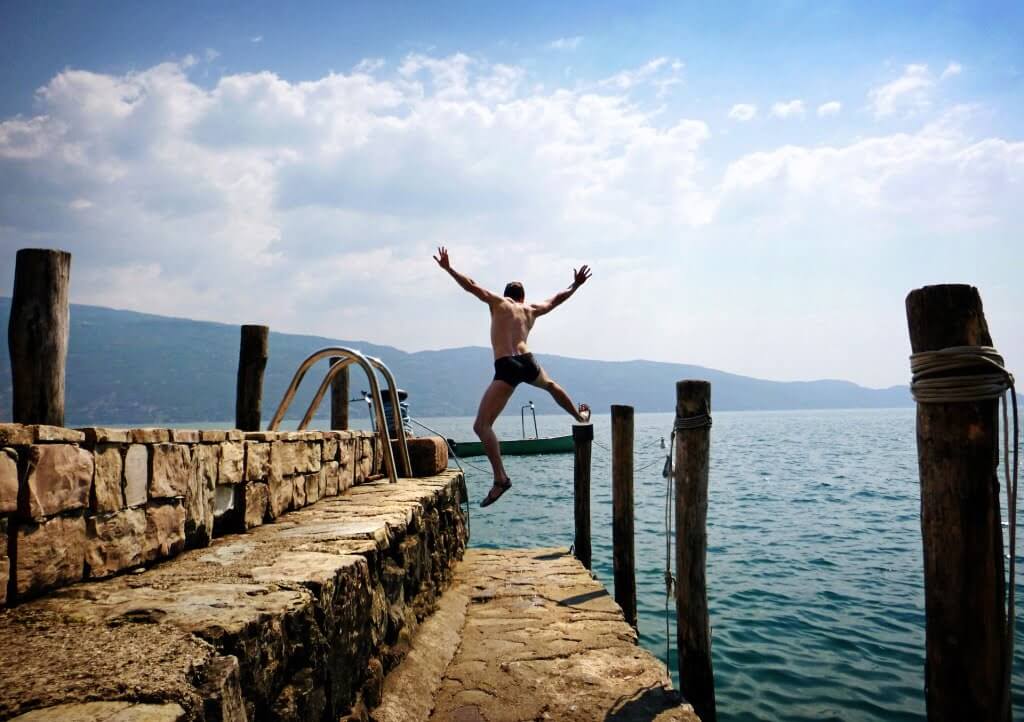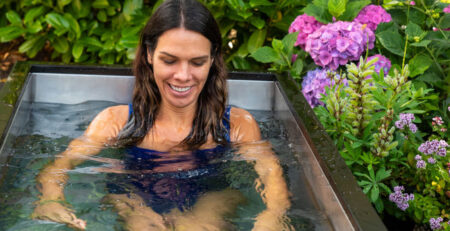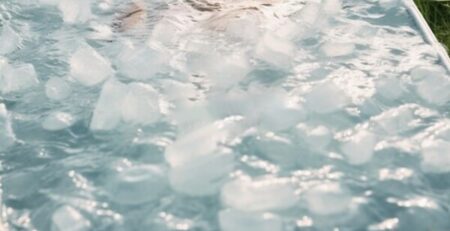We have compiled a large overview of over 30 benefits that you can gain from regular exposure to the cold, i.e., cold plunging. The list is as complete as possible, and there are certainly more fascinating effects worth mentioning. Feel free to use the comment function below to share your positive experiences with cold plunging with the community.

Table of Contents
Physical Advantages
Strengthening the Immune System
Diving into cold water is not only a brave act for those who take on the adventure of cold plunging, but it also seems to have an amazing effect on our immune system. Many who expose themselves to cold water report a remarkable change in the first winter after their first dip: they fall ill less often, and when they do, the course seems to be milder and shorter. This phenomenon may seem inexplicable at first, but science offers some fascinating explanations.
Studies have shown that cold increases the number of our natural killer cells. These brave warriors of the immune system, also known as T and B lymphocytes, are our first line of defense against viruses, bacteria, and even cancer cells. By regularly immersing ourselves in cold water, we can increase the number of these defense cells in our blood, making us better equipped to fight disease.
Another factor that contributes to a strengthened immune system after ice bathing could also be the body’s hormonal reaction to the cold. On contact with cold water, the body releases more endorphins, which not only create a feeling of euphoria but can also have an immunostimulating effect.
The combination of these factors – the increase in natural killer cells, the stimulated metabolism, and the hormonal response – could explain why cold plunging has so many positive effects on our health. It is a natural way to boost the immune system and, at the same time, a source of energy and well-being.
So, next time you’re hesitant to jump in at the deep end, remember: not only could you have an invigorating experience, but you could also give your immune system a boost. Who knows, you might soon feel the benefits and feel fitter and more resilient!
Increased Sense of Well-Being
Plunging into cold water is perhaps one of the most important factors when it comes to our well-being. The noticeable effects afterwards are remarkable. You simply feel happier, more relaxed, more focused, and less stressed. These positive changes affect your overall well-being and leave you feeling happy and content throughout the day. It’s almost like a natural energy boost that enables you to face the challenges of everyday life with ease. And the beauty of it is that it’s not just a subjective feeling – many who have tried cold plunging can confirm the positive effects.
There is even a scientific explanation for this. Contact with cold water triggers a reaction in the body that promotes the release of endorphins, the so-called happiness hormones. These hormones not only provide a feeling of euphoria but also have a demonstrable effect on our mood and stress levels. In addition, the cold water can also improve circulation and relieve muscle tension, contributing to an overall more relaxed and satisfied feeling.
It’s fascinating to see how an action as simple as a dip in cold water can have so many positive effects on our well-being. It’s a natural way to reduce stress, improve mood, and promote an overall sense of happiness and contentment.
Better Heat Balance
Regular cold plunging or cold water swimming makes your body less sensitive to the cold. At first glance, this conclusion may seem like common sense, because if you regularly expose your body to cold temperatures (the same goes for heat), it must be able to respond better. Our bodies are amazing adaptors, and they adapt well to the challenges they face. Researchers speculate that the higher tolerance to cold is due to changes in metabolism. Exercising in cold water also increases the production of brown adipose tissue. This special adipose tissue has the unique ability to convert energy into heat by burning fat, which protects the body from the cold.
The process of adapting to the cold can also play a role in strengthening the immune system. When the body is regularly exposed to cold temperatures, it is forced to adapt and become more resilient. This adaptation can help strengthen the body’s defenses against disease and make it healthier overall.
In addition, regular cold plunges also have a positive impact on mental well-being. The feeling of facing and overcoming the challenge of the cold water can provide a sense of self-control and self-confidence. Many who regularly practice the cold plunge report an increased sense of vibrancy and improved mental clarity.
All in all, regular ice bathing offers a multitude of benefits for body and mind. It strengthens physical resistance to the cold, supports the immune system, and promotes mental well-being. So, the next time you hesitate to venture into the cold water, remember: it’s not only a brave act, but also one that can strengthen your body and mind in many ways.
Weight loss
Cold plunging stimulates your metabolism and can therefore also be an effective way to lose weight. Your body experiences an increased metabolism and needs a considerable amount of energy to warm itself up again.
To enhance this effect even more, you can make a conscious effort to work your body more intensively. However, you should be careful here and not overdo it. For example, when you get out of the ice water, it’s tempting to immediately dry off and escape into the warmth. But for maximum effect on your metabolism, you should instead stay outside in the cold air and actively try to warm up your body with targeted movements such as the Horse Stance.
It is important to understand that the cold stimulus and subsequent warming of the body through muscle contractions help to burn extra calories. So by warming yourself up through exercise, you significantly increase your calorie consumption, which can ultimately lead to more effective weight loss.
One important thing to note is that this method is not just limited to a short time in cold water. Rather, it’s about taking advantage of the whole cold plunge experience by actively helping your body to warm up naturally. Not only can you reap the benefits of the cold stimulus, but you can also make the weight loss process more effective.
So, if you’re looking for an additional way to support your weight loss, regular cold water swimming could be a worthwhile option. It’s a natural way to boost your metabolism and activate your body in a healthy way.
Improved Blood Circulation
When you get out of the cold water, you immediately feel the effects on your body. Your skin is cancerously red, which is a clear indication of the extremely increased blood circulation. Your body pulls out all the stops to warm up your skin and tissue again.
The effect of cold plunging is fascinating: at first, your blood vessels contract to reduce heat loss when you are exposed to the cold water. As soon as you get out of the water, the exact opposite occurs: The body expands the blood vessels again to conduct the body heat to all parts and regulate the temperature. This effect is known as vasodilation and leads to increased blood flow to the body’s tissues.
Vasodilation is an important physiological process that occurs not only during cold plunging but also in other situations where the body needs to regulate temperature, such as during exercise or in high ambient temperatures. This dilation of the blood vessels has many positive effects on the body, including improved blood circulation, faster recovery after physical exertion, and a better supply of oxygen and nutrients to the organs.
In addition, regular exposure to cold water and the associated vasodilation can also improve the elasticity of blood vessels and reduce the risk of cardiovascular disease. It’s fascinating to see how our bodies respond to the challenge of cold plunging and the positive effects it can have on our health.
Better Complexion
Skin problems such as psoriasis, eczema, and acne can actually be improved or alleviated through cold plunging. The combination of the coldness of the water and the accompanying stimulation of circulation can help to reduce inflammation and help the skin to heal. Regular cold plunging can also help to improve the overall appearance of the skin by making it softer and more supple.
Although I personally have not noticed any changes to my skin, I have heard from other cold plungers who have actually experienced a significant improvement in their skin condition from regular cold exposure. These positive effects may be due to several mechanisms, including the stimulating effect of cold on circulation, promoting cell renewal, and strengthening the skin barrier.
It is important to note that the effect of cold plunging on skin problems can vary from person to person, and not everyone will experience the same results. Nevertheless, it may be worth considering cold plunging as a possible addition to your skincare routine, especially if other treatments have not produced the desired results.
As with many things in life, the same applies here: The proof of the pudding is in the eating! If you suffer from skin problems and are curious whether a cold plunge could help you, it might be worth giving it a try and seeing how your skin reacts.
Pain Relief
Cold plunging can be an effective method of relieving pain, such as joint pain, back pain, or muscle tension. The coldness of the water helps to promote blood circulation and speed up the healing process. In addition, cold plunging can directly relieve pain as the cold numbs the pain receptors in the affected areas.
The pain-relieving effect of a cold plunge can also be attributed to the release of endorphins. These endogenous feel-good hormones are released in greater quantities when the body is exposed to cold. Endorphins have a natural pain-relieving effect and can help to reduce the sensation of pain and promote a general feeling of relaxation and well-being.
Many people who regularly take cold plunges report a noticeable improvement in their pain symptoms and increased mobility after plunging. The combination of the physical effect of the cold and the positive effects on hormone production makes cold plunging an attractive option for natural pain relief.
However, it is important to note that cold plunges are not suitable for everyone, and caution should be exercised if you have certain health conditions. Before you start cold plunging, you should therefore always consult a doctor to ensure that it is safe for you and that you can benefit from the potential advantages.
Less Inflammation
The general benefits of cold on the body also extend to its decongestant and anti-inflammatory effects. The cold causes a constriction of the blood vessels and a reduction in blood flow, which leads to a reduction in the inflammatory reaction in the body. This physiological response is particularly valuable in the treatment of swelling, pain, and inflammation.
Another positive effect of the cold is that it reduces the release of inflammatory mediators such as prostaglandins. These biochemical substances play an important role in the regulation of inflammatory processes in the body and are significantly involved in the development of inflammation. By reducing their production, the cold can help to inhibit inflammation and alleviate the symptoms of inflammatory diseases.
These anti-inflammatory properties of cold make it an effective and natural treatment for a variety of conditions, including arthritis, tendonitis, muscle strains, and sprains. The use of cold can also help with rehabilitation after injury or surgery by reducing swelling and inflammation and speeding up recovery.
It is important to note that the use of cold is not suitable for everyone, and caution should be exercised with certain health conditions. It is advisable to consult a doctor before using cold as a treatment method to ensure that it is suitable for you and will not have any negative effects.
Better Regeneration After Sporting Activities
Intense exercise can often lead to muscle inflammation and swelling, which is not only painful but can also affect recovery. Fortunately, cold plunging can be an effective way to deal with these post-workout ailments. The cold of the cold plunge causes a slowing of blood flow to the strained muscles and joints, which helps to reduce inflammation and relieve swelling.
By constricting the blood vessels, the cold reduces the amount of blood flowing to the affected areas, which helps to reduce the accumulation of fluid and inflammatory mediators. This process helps to relieve pain and speed up recovery after intense exercise.
Moreover, cold plunging can have a cooling and soothing effect on the muscles, leading to faster recovery and improved performance. Many athletes swear by cold plunges as part of their recovery strategy, as they not only relieve physical discomfort but can also increase overall well-being.
Better Eyesight
There is no direct scientific evidence that a cold plunge directly improves vision. However, cold plunging is associated with a number of health benefits that can indirectly affect eye wellbeing. For example, cold plunging helps to promote circulation and improve blood flow throughout the body. Good circulation is also important for eye health, as it ensures that the eyes are supplied with sufficient oxygen and nutrients.
Adequate blood flow can help reduce the risk of eye diseases such as glaucoma or age-related macular degeneration (AMD) by supporting the health of eye tissues and maintaining their function. In addition, improved circulation can also help reduce inflammation and minimize the risk of eye problems.
Some people may report a temporary deterioration in their vision after cold plunging, while others may notice an improvement. These individual experiences may be due to various factors, such as the body’s individual reaction to the cold, existing eye conditions or other health factors.
It is important to note that the effect of cold plunging on vision can vary from person to person and that further scientific research is required to understand the exact effects. If you notice a change in your vision after ice bathing, it is advisable to discuss this with an ophthalmologist to determine possible causes and take further action.
Health Benefits of Cold Plunge
Reduced Risk of Cancer
Cold plunging studies have shown that regular exposure to cold water and cold can bring certain remarkable health benefits. One of these benefits is the increased production of antioxidants and anti-inflammatory substances in the body in response to the cold.
Antioxidants play an important role in fighting free radicals in the body, which can cause cell damage and contribute to various diseases, including cancer. By increasing the production of antioxidants as a result of cold plunging, the body will be better able to neutralize these harmful free radicals and reduce the risk of cancer.
In addition, the anti-inflammatory substances induced by the cold can help reduce inflammation in the body, which has also been linked to an increased risk of cancer. By stimulating the production of these anti-inflammatory molecules, cold plunging can help boost the immune system and improve overall health.
It is important to note that further research is needed to understand the exact mechanisms by which cold plunging provides its health benefits, particularly in relation to cancer prevention. Nevertheless, existing studies suggest that regular cold plunging may be a promising strategy to reduce cancer risk and promote overall health.
Increase in White Blood Cells

Immersion in cold water has been shown to have an effect on the production of white blood cells, also known as leukocytes. These cells play a crucial role in the body’s defense against infections. The cold activates the immune system to defend itself against the unfamiliar environment, leading to increased production of white blood cells.
White blood cells are the main players in the immune system and are responsible for recognizing and fighting pathogens such as bacteria, viruses and fungi. By increasing the production of these important immune cells, cold plunging strengthens the body’s ability to fight off infections and maintain health.
The increase in white blood cells caused by ice bathing is not just a short-term reaction, but can also have long-term effects on immune function. By being regularly exposed to cold water, you train your immune system to a certain extent and strengthen its defenses against pathogens.
In addition, the increase in white blood cells from cold plunging can also help to reduce inflammation in the body and promote overall health. A strong and well-functioning immune system is crucial for maintaining health and well-being and cold plunging offers a natural and effective way to boost the immune system and support the body’s defenses.
Better Metabolic Rate
Exposure to cold has an interesting effect on our body’s metabolism. When you expose yourself to the cold, your body reacts by trying to maintain its temperature. To do this, it burns more calories and therefore uses more energy than usual. This process, also known as thermogenesis, helps to boost metabolism and promote fat burning.
In addition, the body’s increased energy intake during cold plunging also has positive effects on the immune system. An active metabolism supports the production of immune cells and improves the circulation of antibodies in the body. This strengthens the immune system’s ability to fend off pathogens and fight infections.
By stimulating the metabolism and strengthening the immune system, cold plunging offers a natural way to improve health and increase well-being. It is fascinating to observe how the body reacts to the challenge of the cold, activating a variety of physiological processes that ultimately lead to better health and an increased sense of well-being.
Reduction of Cortisol
Cold plunging also has a positive effect on cortisol levels in the body. Cortisol, often referred to as the ‘stress hormone’, is produced by the body in response to stress. When you expose yourself to cold water, your body activates a series of physiological responses to adapt to the cold. One of these reactions is the regulation of cortisol levels.
Studies have shown that cold plunging can help to reduce cortisol levels in the body. By dampening the sympathetic nervous system and activating the parasympathetic nervous system, cold plunging helps to put the body in a state of relaxation and well-being. This leads to a reduction in cortisol levels as the body experiences less stress.
A lower cortisol level has numerous positive effects on health and well-being, as well as reducing stress and anxiety. Lower cortisol levels can also help to reduce the risk of stress-related illnesses such as heart disease, diabetes and depression.
By lowering cortisol levels, ice bathing offers a natural and effective way to reduce stress and improve overall well-being. It’s amazing to see how a simple practice like cold plunging can have such a profound effect on the physiological regulation of the body and how it helps to promote balance and harmony throughout the system.
Improvement of Breathing

If you practice breathing techniques before cold plunging, you can experience improved and increased oxygen uptake. Conscious breathing during ice bathing helps to optimize oxygen levels in the body and calm the nervous system. This is achieved through deep and controlled breathing, which supplies the body with sufficient oxygen and, at the same time, helps to reduce stress.
The improved oxygen uptake during ice bathing has a variety of positive effects on the body. By getting more oxygen into the blood, the function of the organs and tissues is improved, leading to an increased sense of well-being and improved performance. In addition, a sufficient oxygen supply helps to stimulate the metabolism and promote cell renewal.
Conscious breathing during cold plunging can also help to calm the mind and reduce stress. By concentrating on your breathing and consciously controlling it, you direct your attention away from stressful thoughts and emotions and towards a state of inner calm and serenity.
It is fascinating to observe how conscious breathing during the cold plunge not only enhances the physical experience but also has a profound effect on the mind and psyche. By focusing on your breathing and consciously controlling it, you can achieve a state of inner calm and balance that lasts long after the cold plunge.
Psychological advantages
Increasing Willpower
Where there’s a will, there’s a way. You have to overcome your inner bastard, especially when cold plunging, because getting into cold water is unpleasant. And it remains unpleasant. However, this feeling disappears after about 30 seconds, and you can stand it much better once you’re in. But it takes a lot of courage and willpower to move, to do cold plunging at all. And you realize how uncomfortable it really is as soon as you put your feet in the cold water. It takes a lot of willpower to mentally force yourself to put your whole body into the ice hole or barrel. But if you can do that, you can do a lot of other things too. Because willpower is not limited to cold plunging. If you master this challenge, it gives you the feeling that you will also master other important challenges in your life.
Better Concentration
Venturing into cold water undoubtedly requires a considerable amount of concentration and focus. You feel the physical pain while at the same time you have to be careful to control your breathing and maintain your balance. These skills you develop while cold water swimming can also prove extremely beneficial in other areas of your life.
The ability to focus on one thing while overcoming pain or challenge is a valuable trait that extends far beyond cold water swimming. In the world of work, for example, the ability to stay focused and work under pressure can make the difference between success and failure. At the same time, the self-control and mental strength you develop while ice bathing can also be of great benefit in personal relationships.
Ice bathing is also a great way to practise mindfulness and be in the here and now. As you surrender to the cold water, you are fully present and focused on what is happening. This form of mindfulness can help to reduce stress and create a deeper connection to yourself and your surroundings.
In short, cold plunging is not only a physical challenge, but also a mental exercise that helps you to strengthen your concentration, self-control, and mindfulness. By regularly taking on this challenge, you can not only improve your physical health but also boost your mental strength and resilience.
More Resilience in Everyday Life
A cold plunge not only helps you acclimatize to the cold, but it can also have a big impact on how you deal with stressful and challenging situations. If you regularly expose yourself to the cold and repeatedly overcome the challenge of cold plunging, you are more likely to be able to adapt better in other areas of your life, too.
The ability to deal with extreme temperatures and overcome the challenges of cold plunging requires not only physical strength but also mental strength and stamina. These qualities are also extremely valuable in other life situations. By facing cold plunging and learning how to navigate through difficult situations, you will develop an inner strength and resilience that can help you cope better with other challenges in life.
In addition, a cold plunge also offers an opportunity for self-reflection and promotes mental health. By giving yourself over to the cold water and overcoming your fears and doubts, you strengthen your self-confidence and self-esteem. This, in turn, can help you to feel braver and more self-confident in other areas of life, making you better able to take on and overcome challenges.
All in all, cold plunging can be an effective way to strengthen your resilience to stressful and challenging situations. By regularly exposing yourself to the cold and pushing your limits, you will not only develop a better tolerance to the cold but also an inner strength that will help you face life’s challenges with confidence and determination.
Mental clarity
Another notable benefit that comes from being immersed in cold water is the various physiological reactions in the body that also affect your brain. In such an extreme situation, your brain needs to focus on the essentials to ensure your survival. In these moments, everyday worries such as the next shopping trip, the conversation with your boss or your child’s birthday party have no place. It’s all about the moment, the here and now.
This mental clarity sets in as soon as you immerse yourself in the ice water. You’ll notice that all your thoughts seem to evaporate. Your brain, like the rest of your body, is well supplied with blood, which boosts your cognitive abilities such as concentration and memory. This state of mental clarity can even last long after the ice bath, and it’s fascinating to see how this increased alertness and sharpness can have a positive effect in other areas of your life.
Ice bathing therefore not only offers a physical challenge and health benefits, but it can also have a significant impact on your mental well-being. So the next time you have the opportunity to face the cold water, don’t hesitate – give it a try and experience the many positive effects on your body and mind for yourself.
Better mood
Winter swimming not only helps to improve your physical health, but can also have a significant impact on your mood and emotional well-being. Immersing yourself in cold water can cause your body to release more endorphins, also known as happy hormones. These chemical messengers have the wonderful ability to create feelings of relaxation and well-being.
The effect of endorphins during winter bathing is comparable to the feeling of euphoria after intense physical activity or a hearty laugh. They can help to relieve stress, reduce anxiety and increase the general feeling of contentment. Many people report a noticeable improvement in their mood and an increased lightness of spirit after an ice bath.
In addition, winter bathing also offers a unique opportunity to relax and switch off from the stresses of everyday life. The concentrated focus on the physical experience of the cold water draws your thoughts away from daily worries and problems and allows you to be in the here and now. This form of mindfulness can help to calm the mind and promote inner peace.
The next time you consider braving the cold water, remember that it can not only benefit your physical health, but can also give your mood a positive boost. Just give it a try and experience the many positive effects on your body and mind for yourself. You’ll be surprised how refreshed and revitalized you’ll feel afterwards!
More motivation
Another notable benefit of cold water immersion is the release of adrenaline and noradrenaline, two powerful hormones that have a variety of positive effects on the body and mind. These hormones are often referred to as ‘stress hormones’ but play a crucial role in regulating energy, alertness, and motivation.
The release of adrenaline and noradrenaline during ice bathing leads to an immediate increase in energy and alertness. You feel more alert, focused, and ready to tackle the day with vigor. This effect can be particularly useful when you are faced with a challenging task or need a boost of energy to get through the day.
In addition, adrenaline and noradrenaline help to increase motivation and improve stamina in difficult situations. They can help you push yourself further and achieve your goals despite fatigue or exhaustion. These hormones are the fuel that enables you to go beyond your limits and surpass yourself.
It is fascinating to observe how immersion in cold water not only triggers physical but also mental processes and helps you to get the best out of yourself. The combination of the refreshing cold of the water and the stimulating effect of adrenaline and noradrenaline makes ice bathing a holistic experience that invigorates and strengthens both body and mind.
Focus on the Essentials
Cold plunging and cold water swimming are not only a test for the body, but also for the mind. The cold is a stressor to which the body responds by activating various mechanisms to adapt and survive. One of these adaptations involves the release of neurotransmitters and hormones that stimulate the brain and improve cognitive function.
The release of these neurochemical substances not only makes you more physically alert and attentive, but also more mentally focused. The distractions of everyday life fade away, and you can better direct your thoughts in the right direction. Ice bathing becomes a moment of clarity in which you concentrate on the here and now and block out all external influences.
This improved focus and increased attention can have positive effects far beyond cold plunging. They can help you be more efficient at work, learn better at school, or be more present and attentive in your personal relationships. By regularly taking on the challenge of cold plunge, you not only train your body, but also your mind, and promote the development of mental strength and concentration.
It is fascinating to observe how cold plunging not only invigorates the body but also stimulates the mind and leads to improved mental clarity. The combination of the refreshing coldness of the water and the stimulating effect on the brain makes cold plunging a holistic experience that strengthens and invigorates both body and mind.
Meditativestate
In addition, the concentration and focus on breathing, especially if you use breathing techniques for cold plunging, as well as the intense body sensations during the cold plunge can be a kind of meditation. When you are in the cold plunge, all thoughts seem to be blown away. It is almost as if you are immersed in a meditative state in which you are completely anchored in the here and now.
In this state of meditation in a cold plunge, you can experience deep inner peace and serenity. The intense sensory experiences and the conscious awareness of your breath and body draw your attention away from everyday worries and thoughts. You immerse yourself in a world of stillness and peace, where only the cold water and your present state count.
The special thing about this meditative state is that it doesn’t just disappear as soon as you come out of the ice bath. Rather, it remains for a while and stays with you even after the plunge. You feel grounded, centered, and clear-headed. This state of mental clarity and inner peace can help you steer your thoughts in the right direction and maintain a positive attitude towards life.
Cold plunging, therefore, not only offers physical and mental challenges, but also a unique opportunity to meditate and promote inner peace. It is a holistic experience that invigorates and strengthens body, mind, and soul in equal measure. The next time you have the opportunity to face the cold water, use it as a chance to not only exercise your body, but also to calm and center your mind.
Mental Strength
Overall, cold plunging helps to improve not only physical strength but also mental strength by enhancing a variety of mental skills and attributes. The challenge of facing the cold water not only challenges your body, but also your mind on various levels.
Cold plunging requires considerable willpower to face the immediate discomfort and cold. It requires the ability to overcome your inner resistance and motivate yourself to keep going despite the challenge. This experience strengthens your willpower and gives you the confidence that you can persevere even in difficult situations.
In addition, cold plunging also boosts your resilience and self-confidence. By regularly exposing yourself to the cold and overcoming it, you develop an inner strength and confidence that can spill over into other areas of your life. You learn that you are capable of overcoming challenges and obstacles, which boosts your self-confidence and gives you a sense of self-efficacy.
Cold plunging can also help to improve your stress management skills by providing you with a way to actively engage with and manage stressors. The conscious decision to withstand the cold plunge can help to strengthen your ability to cope with stress and help you to deal with stressful situations in everyday life more calmly.
In addition, cold plunging also boosts your ability to concentrate by forcing you to focus on the moment and distract your thoughts from outside distractions. This intense focus during cold plunging can help you improve your concentration and attention in everyday life and help you think more clearly and work more effectively.
Overall, cold plunging is a holistic experience that not only strengthens your body but also your mind and helps you develop a variety of mental skills and attributes. It challenges you to grow beyond your limits and supports you to live a life full of confidence, resilience, and mental strength.
Relaxation
An obvious benefit of cold plunging, which everyone can experience immediately after the bath, is its relaxing effect. Although the cold is an initially stressful experience for the body, paradoxically, it also helps to reduce stress and calm the mind. The body responds to the cold with a variety of mechanisms to adapt and survive, and these adaptations can also have a remarkable relaxing effect.
When you plunge in cold water, you activate the parasympathetic nervous system, also known as the ‘rest-and-digest’ system. This activation helps to lower the heart rate, slow down breathing, and reduce muscle tension. The result is a state of inner calm and relaxation that spreads throughout the entire body.
he relaxing effect of cold plunging can not only be felt immediately after the plunge, but can also have a long-term effect on well-being. Regular ice bathing can help to reduce stress, regulate the body’s stress response, and improve overall stress resistance. This can help to alleviate the symptoms of stress-related illnesses such as anxiety and depression, and improve general wellbeing.
The relaxing effects of cold plunging can also help to improve sleep and promote a deeper, more restful night’s sleep. By regularly exposing your body and mind to cold water, you create an opportunity for deep relaxation and regeneration that can have a positive impact on all aspects of your life.
Overall, cold plunging is not only a physical challenge, but also a way to relieve stress, calm the mind, and promote overall well-being. It is a holistic experience that invigorates and strengthens the body, mind, and soul in equal measure and can be a valuable addition to a healthy lifestyle.
Stress Reduction
Cold plunging not only stimulates the body through the cold but also has a remarkable effect on the nervous system. The extreme situation of cold water elicits a response from the autonomic nervous system, which consists of the sympathetic and parasympathetic nervous systems. While the sympathetic nervous system is often known as the “fight or flight” response and prepares the body for activity and stress, the parasympathetic nervous system plays a crucial role in promoting relaxation and calm.
Cold plunging helps to improve the balance between these two parts of the autonomic nervous system by triggering a strong activation of the parasympathetic nervous system. This happens in response to the cold as the body tries to adapt and survive. The activation of the parasympathetic nervous system leads to a lowering of the heart rate, a slowing of breathing, and a reduction in muscle tension, which in turn leads to a feeling of calm and relaxation.
The calming of the nervous system through cold plunging can not only be felt immediately after plunging, but can also have a long-term effect on general well-being. By helping to improve the balance between the sympathetic and parasympathetic nervous systems, ice bathing helps to regulate the body’s stress response and promotes a sense of inner calm and balance.
In addition, the calming of the nervous system through cold plunging can also help to alleviate the symptoms of stress-related illnesses such as anxiety and depression, and improve overall stress resistance. It is fascinating to observe how ice bathing not only stimulates the body but also promotes deep relaxation and regeneration on a neurological level, which can have a lasting impact on overall well-being.
Release of Endorphins
Exposure to cold leads to the release of endorphins in the body, often referred to as ‘happy hormones’. These natural neurotransmitters have a powerful effect on our well-being and mood. When your body is exposed to the cold, it responds by releasing endorphins to deal with the discomfort and promote a positive response to the challenge.
The effects of endorphins extend far beyond cold adaptation. They play an important role in lowering your stress levels and improving your mood. By binding to specific receptors in the brain, endorphins create a sense of relaxation and well-being that reduces stress and increases overall mental well-being.
The release of endorphins during cold plunging can help to relieve stress, reduce anxiety, and promote a positive mood. This can help to alleviate the symptoms of stress-related illnesses such as anxiety and depression, and increase general well-being.
It’s fascinating to observe how cold exposure not only provides a physical challenge but also has a profound effect on our neurological chemistry by stimulating the release of endorphins. These natural ‘happy hormones’ provide an effective way to reduce stress, improve mood, and promote a sense of wellbeing that lasts long after the ice bath.
Reduction of Anxiety
Cold plunging has proven to be an effective way to relieve stress and reduce anxiety. A growing number of studies have investigated the positive effects of regular cold plunging on mental health and have found promising results. One of these studies has shown that regular cold plunging can lead to improved stress management and a reduced risk of depression.
The mechanism by which cold plunging reduces stress and improves mood is complex. Firstly, the cold water activates the sympathetic nervous system, which is responsible for the “fight or flight” response. This leads to an increased release of neurotransmitters such as dopamine and serotonin, which are responsible for well-being and mood regulation. At the same time, the cold acts as a natural stressor, stimulating the body to adapt to the challenge and regulate its stress response.
Cold plunging also offers an opportunity to relax and let go. When you surrender to the cold water, you focus entirely on the moment and let go of all worries and thoughts. This meditative state can help to calm the mind and reduce stress, which in the long term can lead to improved stress management and a reduced risk of depression.
It’s impressive to see how a practice as simple as ice bathing can have such a profound effect on mental health. By regularly immersing yourself in cold water, you can not only strengthen your body but also nourish your mind and soul, promoting a sense of inner calm and balance.
Better sleep

The feeling after an cold plunge is often comparable to that after a sauna session. The body’s immediate reaction to the cold is an increased stress and tension response. During this time, you experience intense stimulation that challenges your body in various ways. However, just like after a sauna session, the cold plunge is followed by a feeling of relaxation and well-being.
Many cold plungers report a significantly faster and better sleep process after an cold plunge. The combination of the intense physical activity and the subsequent relaxation helps to prepare the body and mind for sleep. The muscles relax, breathing becomes calmer and the mind is freed from stressful thoughts.
Due to the deep relaxation that sets in after a cold plunge, many people experience a deeper and more restful sleep. They wake up in the morning feeling refreshed and rested, ready to start the day with energy and vitality. This deep sleep is crucial for the regeneration of the body and mind and contributes significantly to an overall improved sense of well-being.
It is amazing to see how a short time in cold water not only stimulates the body but also promotes deep relaxation, leading to restful sleep. Cold plunging, therefore, not only offers immediate health benefits but also supports the long-term maintenance of health and well-being through restful and regenerative sleep.
My conclusion
Cold plunging brings with it an incredible wealth of physical and psychological benefits. For each individual, only a few of these are usually relevant, but it has pleasant and positive side effects in areas where things may not be going optimally for us. For me personally, the mental benefits are the most important. I have always found Mind over Matter interesting, and it has remained so. I am a person who likes to try new things and am therefore very happy with the results so far. Cold plunging is now my biohack that I wouldn’t want to do without :-)












Leave a Reply